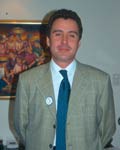Q & A with Alejandro Sinibaldi Director of the Guatemalan Tourism Institute (INGUAT)


Q- The Guatemalan government appointed you as leader of the nation´s top tourism organization just a few months ago. How is your administration going to promote tourism in your country? What strategies will be used?
A- First of all, what we did was to find out what markets Guatemala needed to focus on, and we did that in the wake of a number of visitors that the country welcomed from our top-priority markets in Central America, Mexico, the U.S. and Canada, as well as Spain, France, Italy, Germany and the U.K. in Europe. Those are the markets we´re pouring most of our efforts into as far as promotion and advertisement are concerned. The second step was to map out a strategy and invite advertising companies in our country to put together a huge promotional blitz that´s due out on July 15 in the U.S. That´s a major promotional endeavor that includes breakfasts with top-tier travel agents and wholesalers, as well as reps from major airlines that bring U.S. passengers to Guatemala. In the case of the Mexican market, we´re zeroing in on wholesalers and on some specialized media organizations. We´re applying a similar policy in Central America.
As to Europe, well, our strategy there has been quite different because having a nonstop flight between a European location and Guatemala was by far the main hurdle we had to clear, a claim that countless researchers, as well as Spanish and European wholesalers had been staking for years. So, we were bound to concentrate our efforts on finding an airline that could actually meet our needs. Four months later, we´re just about to cut a deal with Iberia for a Madrid-Guatemala route, and there´re some pretty good chances of clinching another flight between Milan and Guatemala City. Now we´ll have to talk to the premier wholesalers in order to launch out joint campaigns and promote our country as a well-shaped product.
As you can see, we´re putting a totally different spin on tourism and we´ll have a lot to talk about in terms of political actions now underway, new legislative reforms, the quest for a hands-on involvement of the private sector and less engagement of the public sector.
Q- Is Spain important to you?
A- Yes, it is. As a matter of fact, it´s a top-priority market for our
country. In addition to that, we´re historically and culturally bonded together. That´s why I´ve traveled five times to Spain since I became INGUAT director.
Q- What company have you advanced talks with, Iberia or Air Madrid?
A- We´re working with Iberia.
Q- Will there be any nonstop flights from Cuba to Guatemala on Aerocaribbean or, say, Cubana de Aviacion?
A- We´re working in that direction. Talks are not as advanced as on the Madrid-Guatemala flight and I´m not enthused to give any information on this issue right now. However, I think it´s important to say that Tikal Jets, the Guatemalan air carrier, is strengthening its service to and from Cuba.
Q- Are you going to set up a joint fund, as you´ve done in other countries in the region, to step up tourism promotion and development?
A- We´re weighing a number of scenarios and models, like the Chilean or the Mexican. The decision is to create a board of directors with more participation of the private sector. What we need to do is to follow up the working plans and actions that the new leadership of INGUAT and the country´s new administration are carrying out. With that view in mind, we´re planning to make some changes to the INGUAT legislation and come up with a few bills in an effort to implement an important follow-up process that brooks no further delay.
Q- We´ve seen your institute attending different fairs and events. For instance, you dispatched one of your top advisors to Havana´s Tourism Convention. What have you really seen in these Caribbean fairs? What positive elements have you been able to grasp in these travel tradeshows?
A- Guatemala kicked off a new promotional and advertisement strategy in February. We´ve been to Costa Rica, Puerto Rico, Cuba, Mexico. We´ve also attended some of Europe´s biggest travel marketplaces. In the case of the Cuban Convention, we were trying to get in touch with wholesalers that sell the Cuban destination right now, hold talks with airlines and charter operators now flying to the island nation. The point is that we´re seeing Spanish tourists, European tourists and vacationers from elsewhere in Cuba, so we´re looking for the right mechanism to make those travelers come to our country as part of a multi-destination plan. There were some interesting talks with charters and wholesalers there, and we hope to see results in the short run.
Q- Has it ever occurred to you that you could some day join the CTO (Caribbean Tourism Organization)?
A- No, we haven´t thought about that. However, I do believe CATA´s efforts are truly paying off. We´re putting Central America on the map through CATA. Maybe we´ll consider the possibility of joining the CTO in due time.
Q- What political actions has your government taken to guarantee safer tourism in the country?
A- As far as safety and security are concerned, President Berger has been very clear. The development of the travel industry is one of his top priorities, to such an extent that everybody is now committed to the physical protection of travelers, the protection of their food and the facilities they stay at. We´re right now cranking up an aggressive domestic promotional campaign to target the Guatemalan people, to show them the importance of tourism at an economic, social and cultural level.
Among the political actions we´ve taken I can mention the establishment of tourism-related crimes and stepped-up sentences for offenders. This sends a very strong signal that tourists must be taken care of as efficiently as the President is taken care of. That´s the message our President has put across and we´re committed to that message.
Q- Is there any educational campaign targeting children so that they can assess the true value of tourists as key players for the economic development of their country?
A- The campaign I mentioned to you is not only targeting children, but the entire population nationwide by showing what tourism is doing for our country and its possibilities for businesspeople of all stripes, whether they are tycoons, mom-and-pop owners, small-time impresarios or fledgling entrepreneurs. We´re convinced that tourism transforms lives. President Berger has been very clear in that respect and we´re simply sending out that message. We´re even weighing the possibility of overhauling the study content of our schoolchildren in order to teach them good manners and lay bare the tremendous role that tourism plays in our country´s economy.
Q- Have you reached some kind of agreement with international HMOs to secure healthcare for tourists visiting Guatemala?
A- We haven´t signed any agreement yet, but we´re working in that direction.
Q- One last question. What do you make of multi-destination, not only in Central America, but also between other Caribbean destinations, for instance, and Guatemala?
A- We believe multi-destination is a logical process, especially for long-staying tourists that want to visit several countries at the same time during their vacations. That´s how the Playa Maya-Cuba travel package first popped up in the first place. We´re also toying with the idea of a Central American multi-destination, a process whereby we offset one another and offer a far broader experience to our visitors.
Q- Is there anything else you´d like to add for this interview?
A- Guatemala is a beautiful country, a nation that has a relatively small territory to offer, but packed with choices for our visitors. That´s why the cultural element keeps gaining momentum with each passing day. We´re confident that Guatemala is a good, viable alternative for European tourists and for sunbathers from elsewhere, a country that packs an unforgettable punch.














